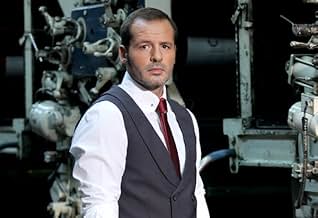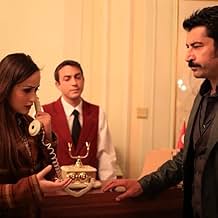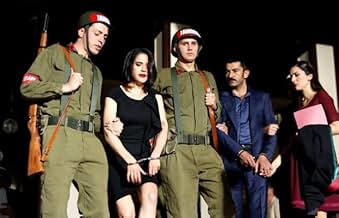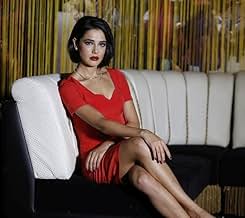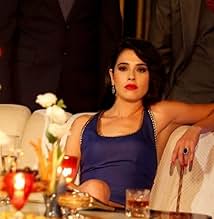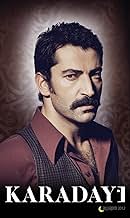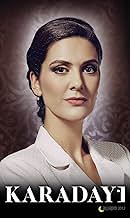NOTE IMDb
7,7/10
6,3 k
MA NOTE
Ajouter une intrigue dans votre langueThe Kara family's life is turned upside down because of a wrongful accusation that results in the imprisonment of Nazif Kara for a murder he didn't commit.The Kara family's life is turned upside down because of a wrongful accusation that results in the imprisonment of Nazif Kara for a murder he didn't commit.The Kara family's life is turned upside down because of a wrongful accusation that results in the imprisonment of Nazif Kara for a murder he didn't commit.
- Récompenses
- 18 victoires et 9 nominations au total
Parcourir les épisodes
Avis à la une
10mwaceves
I loved this series. I don't speak Turkish, but I found a way to see it through all three seasons.
First, I loved the actors. All the principal actors were fantastic. The Kara family, Feride and her mother, the friends from the neighborhood, the other love interests, were all very believable. A few of the bad guys were over the top, but I guess the global audience loves seeing the bad boys being bad. Targut was kind of funny when he had his tantrums.
I thought the plot was well developed and had lots of interesting twists. I enjoyed the backstories of all the characters. I fell in love with the Kara family, especially the parents, with their love, strength, courage and poetic embrace of life.
The direction was good. The actors worked together seamlessly. All that emotion was pulled out of everyone. There were many beautiful romantic scenes. The director did not depend on cheap tricks, like showing the same events over and over, or holding onto facial expressions too long. The settings were interesting.
I binge watched season 1 subtitled in English on Netflix. The rich voices of the actors made it easier to read along and know what was going on. After season 1, I looked around YouTube for more English, but
just found a few scenes.
Then I found Resumen HD in Spanish. This became the Feride and Mahir show because they cut most of the other scenes that had other actors, keeping just enough to keep the plot together. There were things that I never did understand, like why Mahir's brother had a sudden change of opinion, but I still enjoyed watching the story to the end.
First, I loved the actors. All the principal actors were fantastic. The Kara family, Feride and her mother, the friends from the neighborhood, the other love interests, were all very believable. A few of the bad guys were over the top, but I guess the global audience loves seeing the bad boys being bad. Targut was kind of funny when he had his tantrums.
I thought the plot was well developed and had lots of interesting twists. I enjoyed the backstories of all the characters. I fell in love with the Kara family, especially the parents, with their love, strength, courage and poetic embrace of life.
The direction was good. The actors worked together seamlessly. All that emotion was pulled out of everyone. There were many beautiful romantic scenes. The director did not depend on cheap tricks, like showing the same events over and over, or holding onto facial expressions too long. The settings were interesting.
I binge watched season 1 subtitled in English on Netflix. The rich voices of the actors made it easier to read along and know what was going on. After season 1, I looked around YouTube for more English, but
just found a few scenes.
Then I found Resumen HD in Spanish. This became the Feride and Mahir show because they cut most of the other scenes that had other actors, keeping just enough to keep the plot together. There were things that I never did understand, like why Mahir's brother had a sudden change of opinion, but I still enjoyed watching the story to the end.
Reading some of the others' comments confirms for me that unfortunately world-wide audiences of a particular country's screen industry forget to drop their own cultural spectacles for another pair for the vastly different sensibility that is conveyed - here Turkey. Also to realise that these dizi are a unique format. An English speaking 'westerner' just doesn't 'get it' always. Many 'southern-Europe-to-middle-eastern' ways of thinking are vastly different. The under-pinning of secular Islam is very enlightening, as fans who view a lot of this genre can attest; so much of that culture relates so well to the best life values. (Yet often there is no overt 'religiousness', bar the plain rituals of funeral and wedding.) It's so good to get a feel for all of these things. Marshall-ah! The family table; the emphasis on healthy eating, the daily courtesies, the patterns expected in the 'coupling' department, the tactile affection commonplace between siblings and family members,
Story-telling is so embedded, poetry is generally known and treasured and metaphor and allegory are everywhere in this part of the world, and in Karadayi. In my country anyone who drew attention to themselves gently to launch into an often poetic story, and to have the company s/he's with (usually his family) attentively loving it would be an oddity. The Persian, Sufi, Aramaic, Turkish, Arab and all the 'stahns' have a huge store of narrative. Long-windedness can be a put-down summation. We have to start by knowing that these TV dizi are not 'soaps' - they are tele-novellas with 2 or 3 seasons separated by and summer breaks. For impatient Anglo-celtics they can be too drawn out, but for me as someone who just isn't held by today's trends Sci-fi, or CGi, GOT, Block-busters or fantasy, there is gold to be found in Turkish drama. The ease of incorporating passion, sensory delight, sweet verbal exchanges perfectly expressed in ease of owning emotion and poetic sweetness. The de-sensitised "West' calls these attributes cheesy, cliche - sadly.
The technical expertise in Karadayi is to die for, settings, location always real (not parked out like the US/UK ones can be) - costumes perfect etc. Karadayi just won me over right at the start; amazing to see a 1970s setting in perfect detail; dial telephones, woolen overcoats, flared pants, snall family shops, tweed women's professional suits, non-skyhigh heels, American imported cars. I couldn't fault any of these aspects. And I'm surprised that no other comment has rejoiced in this. (No cellphones interrupting every 5 minutes as they do in the large number of contemporary urban popular dizi!).
There seems to an endless supply of gorgeous looking people in the cast but also the ordinary and unprepossessing. Kenan Irmilioglu is of charismatic looks, is tall and imposing with his co-star Bergutor Kolar a tall actor also, a perfect foil for her co-lead. Mahir is too noble by far perhaps, given as he is, to fiery anger often causing trouble. Cetin Tekendor is a veteran 'older person' with a 'centering' role in the story. But all the cast performs expertly. Netflix often start a sub-titled series off, but due to contract issues will often show only the 1st Season. The frustrated viewer must search for various server Groups ('Turkish Dramas with English subtitles' is a starting Google) which provide sub-titled versions which usually require a donation.
I give this series high praise - although I may find viewing all episodes for the full show's length a challenge as always there seems to be a too dense middle stage with more sub-plots and additional characters, adding twists and turns. But Karadayi has so much going for it it should be worth going the full distance.
Story-telling is so embedded, poetry is generally known and treasured and metaphor and allegory are everywhere in this part of the world, and in Karadayi. In my country anyone who drew attention to themselves gently to launch into an often poetic story, and to have the company s/he's with (usually his family) attentively loving it would be an oddity. The Persian, Sufi, Aramaic, Turkish, Arab and all the 'stahns' have a huge store of narrative. Long-windedness can be a put-down summation. We have to start by knowing that these TV dizi are not 'soaps' - they are tele-novellas with 2 or 3 seasons separated by and summer breaks. For impatient Anglo-celtics they can be too drawn out, but for me as someone who just isn't held by today's trends Sci-fi, or CGi, GOT, Block-busters or fantasy, there is gold to be found in Turkish drama. The ease of incorporating passion, sensory delight, sweet verbal exchanges perfectly expressed in ease of owning emotion and poetic sweetness. The de-sensitised "West' calls these attributes cheesy, cliche - sadly.
The technical expertise in Karadayi is to die for, settings, location always real (not parked out like the US/UK ones can be) - costumes perfect etc. Karadayi just won me over right at the start; amazing to see a 1970s setting in perfect detail; dial telephones, woolen overcoats, flared pants, snall family shops, tweed women's professional suits, non-skyhigh heels, American imported cars. I couldn't fault any of these aspects. And I'm surprised that no other comment has rejoiced in this. (No cellphones interrupting every 5 minutes as they do in the large number of contemporary urban popular dizi!).
There seems to an endless supply of gorgeous looking people in the cast but also the ordinary and unprepossessing. Kenan Irmilioglu is of charismatic looks, is tall and imposing with his co-star Bergutor Kolar a tall actor also, a perfect foil for her co-lead. Mahir is too noble by far perhaps, given as he is, to fiery anger often causing trouble. Cetin Tekendor is a veteran 'older person' with a 'centering' role in the story. But all the cast performs expertly. Netflix often start a sub-titled series off, but due to contract issues will often show only the 1st Season. The frustrated viewer must search for various server Groups ('Turkish Dramas with English subtitles' is a starting Google) which provide sub-titled versions which usually require a donation.
I give this series high praise - although I may find viewing all episodes for the full show's length a challenge as always there seems to be a too dense middle stage with more sub-plots and additional characters, adding twists and turns. But Karadayi has so much going for it it should be worth going the full distance.
I feel compelled to reply to some comments made in this forum. Ezel was my first experience of a Turkish TV series and I adored it. I do not agree that the show was boring, nor complicated. Once you got your head around the plot it was simple enough to work out! As for boring, well the slow motion & emotional scenes are what is best about these shows. I had been watching American shows prior and yes I enjoyed some very much,however by comparison most are filled with explicit sex scenes and overly glamorous film stars. There are exceptions naturally, and I have set aside that aspect in those that I have liked.
Yes there is a glamour to the cast of Ezel and Karaday1 but they come across as super intelligent and real. You can relate to them easily. They come across as deep and meaningful people who have worked hard to achieve such successful shows.
I am mid way through Karaday1, loving every second of it, as mentioned in other reviews, I too cannot wait till the next episode. I too find myself binge watching, till wee hours and not ashamed to admit the odd afternoon session.
Karaday1 did take a little longer for me to get into, but it gets better as it goes along. Long - yes, boring - definitely not, complicated - takes concentration which is a credit to the writers.
The music to Ezel is haunting and will stay with me forever. Thank you Turkish TV
Yes there is a glamour to the cast of Ezel and Karaday1 but they come across as super intelligent and real. You can relate to them easily. They come across as deep and meaningful people who have worked hard to achieve such successful shows.
I am mid way through Karaday1, loving every second of it, as mentioned in other reviews, I too cannot wait till the next episode. I too find myself binge watching, till wee hours and not ashamed to admit the odd afternoon session.
Karaday1 did take a little longer for me to get into, but it gets better as it goes along. Long - yes, boring - definitely not, complicated - takes concentration which is a credit to the writers.
The music to Ezel is haunting and will stay with me forever. Thank you Turkish TV
My husband and I binge watch this 1st series of Karadayi and enjoyed every episode and not wanting them to finish. We feel anxious now about when we might see the 2nd and 3rd series on Netflix in Australia??
This series is up there with Magnificent Century, 1001 Nights, Gran Hotel and we have had many late nights trying to fit in as many episodes as we could. Just lovedit!!
The music, scenery and the acting are amazing all the actors had a depth that draw you in to their colourful worlds. We find that there is no going back to TV in general for us which has no content to speak of.
The Turkish sure know how to put together a great series that keep you wanting to go back each night to catchup on their stories.
Without good acting though the storyline would not be realised as it is in these series, wonderful actors who portray their characters so well.
It's a 20 out of 10 for us!!
Sue and Dan Australia
This series is up there with Magnificent Century, 1001 Nights, Gran Hotel and we have had many late nights trying to fit in as many episodes as we could. Just lovedit!!
The music, scenery and the acting are amazing all the actors had a depth that draw you in to their colourful worlds. We find that there is no going back to TV in general for us which has no content to speak of.
The Turkish sure know how to put together a great series that keep you wanting to go back each night to catchup on their stories.
Without good acting though the storyline would not be realised as it is in these series, wonderful actors who portray their characters so well.
It's a 20 out of 10 for us!!
Sue and Dan Australia
I feel a duty to share my feelings about Karadayı. I watched this series dubbed in Persian split in 350 episodes. I feel a close cultural background with this story especially the timeframe of its events in the 1970s. As a whole, the series look quite different in texture from almost every other series or movie I have ever watched in my life. It is very real. I am not a critique, but I am going to share what I could absorb from Karadayı:
1. I admire the great play by Kenan İmirzalıoğlu, Bergüzar Korel, Çetin Tekindor, Yurdaer Okur, and virtually all the cast. I can't point out any particular actor/actress. They are a team of professionals in one place. Kenan, for instance, can express a broad spectrum of feelings on his face. He can mimic, let's say, 15 shades of happiness, 16 shades of sadness, 17 shades of anger, combinations of them, as well as diverse shades of indifference, astonishing, and virtually any feeling in its right context without any exaggeration. In his extreme anger, Kenan can momentarily get a little bit hopeful and happy; and then resume to his previous level of anger. For example, anytime after getting good news about his father, Nazif, who he holds him in high regards, his face blows into cheers and happiness. I have never been able to feel the life as vivid as Kenan feels it!. He should be a gifted actor whose face muscles are richly innervated. Kenan has been excelling in his roles compared to his plays in the previous series. Same thing with Bergüzar. She can love you now and despise you next minute. She can be so flirting in this scene and so serious in the next scene. They both can cry anytime they want. Other main characters are also great players. I should also congratulate the Persian dubbers. They conveyed passion, love, kindness, anger, and every other feeling through their voices. You could easily tell when the character was determined or hesitant just by listening to their voices. Kenan has enjoyed many dubbers in his other series such as Ezel, but Mr. Nader Keymaram has done an extraordinarily superior dubbing job for Kenan in this series.
2. The directorship is simply GREAT! The way the scenes relate to each other and the story timeline is put together entices you to be impatient to watch the following scene or the next episode. I couldn't sleep enough just to watch it continuously, even 15 episodes in a row sometimes. Although the story could still be trimmed easily, the prolonged story is not a big deal, especially when moral lessons fill in the conversations.
The series depict a story that seems very real. I noticed some less real or less logical parts throughout the story, but they are infrequent and pleasantly forgivable. These less real scenes are just symbolic, used to narrate the message of the story, and don't affect the beauty of the whole thing.
There is a high fidelity in expressing the time of day (using dusk, the moon, and the newspaper boy) and time of year (using people's clothing, green plants, winter trees, snow, and people discussing weather).
3. The camera does a professional job. The camera captures the scenes virtually from any angle regardless the location, either a small room, on the street, on a hill, etc. The camera is just salient in three dimensions. It can move fast focusing in or out, descending or ascending based on the stress level of the scene. It can suddenly start to swirl vertically or horizontally if needed. It showed Mahir once he was sitting on his bed in the jail, leaning to wall behind, drown in his thoughts and banging his head slightly, slowly, and repeatedly to the wall. The camera, showing him from his side 90 degrees turned, as if he is banging is head to the ground, to entrain your empathy with his deep sorrow. The camera does a lot of subtle tricks in every episode. I wish I were a cinema critic to pick all its tricks. But the ones I can notice, help me to feel the fragrance of the scenes better. The light helps the camera to emphasize the feelings of the characters much better.
4. The music is from a great Turkish composer, Toygar Işıklı. I didn't know him before, but I am addicted to some soundtracks such as Ateşe Yürümek, Ölüme Gülümse (İdam Sehpası), Elimi Tut, and Benden Kaçış Yok (Turgut). I should appreciate his choices of the old songs including but not limited to Sensiz Saadet Neymiş (by Yaşar Güvenir), Kıskanıyorum (by İnci Çayırlı), Unutama Beni (by Esmeray), Geri Dönülmez Bir Yoldayım (by Neşe Karaböcek), Sensiz Kaldığım Geceler (by Şecaattin Tanyerli)
In summary, Karadayı is the best series I've ever watched. I laughed and cried with the characters. I was just stuck to the chair, hungry to watch next episodes. I wish it never ended. I will watch it again next summer.
1. I admire the great play by Kenan İmirzalıoğlu, Bergüzar Korel, Çetin Tekindor, Yurdaer Okur, and virtually all the cast. I can't point out any particular actor/actress. They are a team of professionals in one place. Kenan, for instance, can express a broad spectrum of feelings on his face. He can mimic, let's say, 15 shades of happiness, 16 shades of sadness, 17 shades of anger, combinations of them, as well as diverse shades of indifference, astonishing, and virtually any feeling in its right context without any exaggeration. In his extreme anger, Kenan can momentarily get a little bit hopeful and happy; and then resume to his previous level of anger. For example, anytime after getting good news about his father, Nazif, who he holds him in high regards, his face blows into cheers and happiness. I have never been able to feel the life as vivid as Kenan feels it!. He should be a gifted actor whose face muscles are richly innervated. Kenan has been excelling in his roles compared to his plays in the previous series. Same thing with Bergüzar. She can love you now and despise you next minute. She can be so flirting in this scene and so serious in the next scene. They both can cry anytime they want. Other main characters are also great players. I should also congratulate the Persian dubbers. They conveyed passion, love, kindness, anger, and every other feeling through their voices. You could easily tell when the character was determined or hesitant just by listening to their voices. Kenan has enjoyed many dubbers in his other series such as Ezel, but Mr. Nader Keymaram has done an extraordinarily superior dubbing job for Kenan in this series.
2. The directorship is simply GREAT! The way the scenes relate to each other and the story timeline is put together entices you to be impatient to watch the following scene or the next episode. I couldn't sleep enough just to watch it continuously, even 15 episodes in a row sometimes. Although the story could still be trimmed easily, the prolonged story is not a big deal, especially when moral lessons fill in the conversations.
The series depict a story that seems very real. I noticed some less real or less logical parts throughout the story, but they are infrequent and pleasantly forgivable. These less real scenes are just symbolic, used to narrate the message of the story, and don't affect the beauty of the whole thing.
There is a high fidelity in expressing the time of day (using dusk, the moon, and the newspaper boy) and time of year (using people's clothing, green plants, winter trees, snow, and people discussing weather).
3. The camera does a professional job. The camera captures the scenes virtually from any angle regardless the location, either a small room, on the street, on a hill, etc. The camera is just salient in three dimensions. It can move fast focusing in or out, descending or ascending based on the stress level of the scene. It can suddenly start to swirl vertically or horizontally if needed. It showed Mahir once he was sitting on his bed in the jail, leaning to wall behind, drown in his thoughts and banging his head slightly, slowly, and repeatedly to the wall. The camera, showing him from his side 90 degrees turned, as if he is banging is head to the ground, to entrain your empathy with his deep sorrow. The camera does a lot of subtle tricks in every episode. I wish I were a cinema critic to pick all its tricks. But the ones I can notice, help me to feel the fragrance of the scenes better. The light helps the camera to emphasize the feelings of the characters much better.
4. The music is from a great Turkish composer, Toygar Işıklı. I didn't know him before, but I am addicted to some soundtracks such as Ateşe Yürümek, Ölüme Gülümse (İdam Sehpası), Elimi Tut, and Benden Kaçış Yok (Turgut). I should appreciate his choices of the old songs including but not limited to Sensiz Saadet Neymiş (by Yaşar Güvenir), Kıskanıyorum (by İnci Çayırlı), Unutama Beni (by Esmeray), Geri Dönülmez Bir Yoldayım (by Neşe Karaböcek), Sensiz Kaldığım Geceler (by Şecaattin Tanyerli)
In summary, Karadayı is the best series I've ever watched. I laughed and cried with the characters. I was just stuck to the chair, hungry to watch next episodes. I wish it never ended. I will watch it again next summer.
Le saviez-vous
- AnecdotesKaradayi was awarded Best Drama TV Series at 40th Golden Butterfly Awards in 2013.
Meilleurs choix
Connectez-vous pour évaluer et suivre la liste de favoris afin de recevoir des recommandations personnalisées
- How many seasons does Karadayi have?Alimenté par Alexa
Détails
Contribuer à cette page
Suggérer une modification ou ajouter du contenu manquant


